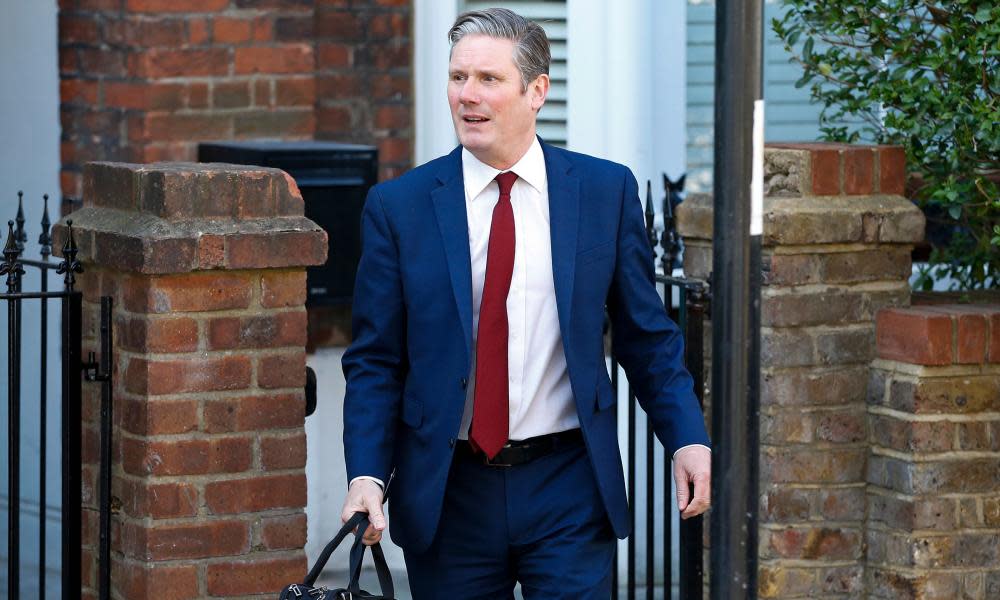A conference call with his defeated rivals – then Keir Starmer was straight down to business

Keir Starmer was at home in north London at 10.30am on Saturday when he heard he had become leader of Labour party. The news was broken to him and the two defeated candidates, Rebecca Long-Bailey and Lisa Nandy, in a conference call organised by Jenny Formby, the party’s general secretary.
Related: Victorious Keir Starmer pledges to restore trust in Labour
After accepting everyone’s congratulations, Starmer composed himself, brushed himself down and headed straight off with two of his officials to the leader of the opposition’s office in Westminster. There his first task was to ring Boris Johnson at No 10 to accept the prime minister’s offer to work together on the coronavirus crisis.
The suite of rooms in Portcullis House allotted to the opposition leader had been vacated by Jeremy Corbyn and his staff – or at least largely vacated – some days before. “It was a bit of a mess to be honest when we got there,” said a source close to Starmer. “There were boxes, clothes, papers everywhere.”
Starmer must now start sorting out the mess that is the Labour party. But as if that were not challenge enough, a very large part of his focus must also be on the national emergency which forms an extraordinary backdrop to the start of his leadership.
In his call with Johnson, the new Labour leader agreed to meet him in Downing Street next week to discuss what must be done to tackle coronavirus, and to hold further discussions at regular intervals on privy council terms . He said in his victory statement that with the pandemic wreaking havoc, Labour needed to be ready to behave differently to an opposition in normal times and to have “the courage to support where that’s the right thing to do”, while fully holding the Johnson government to account.
Starmer will now begin the task of restoring unity and a sense of belief within a Labour party whose morale has been shattered by two general election defeats under Corbyn, the latter of which, last December, was the worst for Labour since 1935. He will start appointing his shadow cabinet on Sunday, providing key signals as to how inclusive he intends to be after years of factionalism.
In the afterglow of his victory, he will have been gratified by signs that the party is ready to pull together. Congratulations and good wishes were showered on Starmer (who’s seen as on the soft left) from people on the left, right and centre of Labour.
From the right, former cabinet minister Ben Bradshaw expressed relief at the result, tweeting: “So happy for my beloved Labour party & country. First time I’ve backed a winning candidate the public might make PM since TB.”
But from the left, too, there was a recognition that Starmer had won a mandate that should command loyalty across the party. Sam Tarry, the new MP for Ilford South, who used to work for Corbyn, said both Starmer and the newly elected deputy leader, Angela Rayner, had been supported by people from across the party, and there was no alternative but to feel hope and come together. “There is a real mood in the party to unite,” said Tarry.
In a further sign that the grip of the left had been weakened, three byelections to the national executive committee on Saturday all delivered “mainstream” candidates.
Starmer faces huge challenges rebuilding a party all but destroyed in Scotland, and which imploded at the election in many of its heartlands in the north and Midlands. There is also the issue of antisemitism and the upcoming report of the Equality and Human Rights Commission on Labour’s handling of complaints into the issue. That hovers like a giant cloud.
But there was a sense that, out of the disasters of coronavirus and its recent election losses, Labour can show again that it is the party of community, of public service, of working people who make the country function.

 Yahoo News
Yahoo News 
